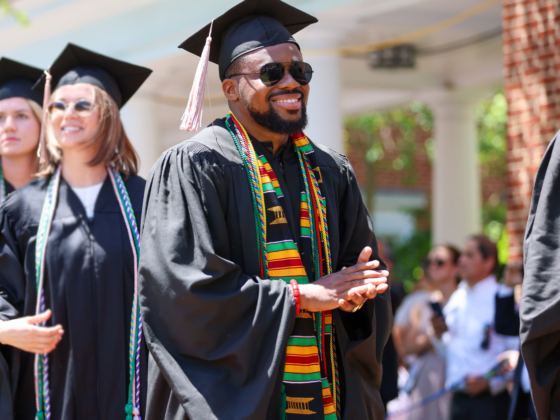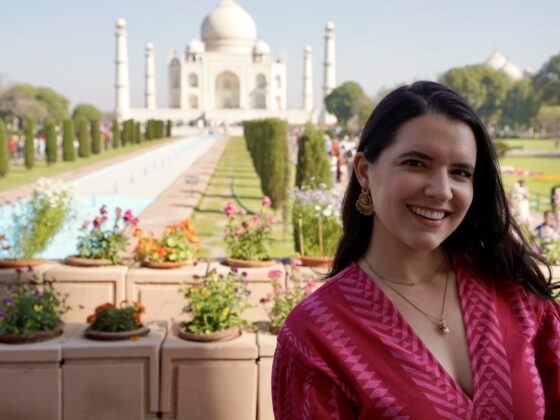Mac Caputi is a second-year Darden MBA student (Class of ’25). During the summer, Mac worked as a Summer Associate at Bain & Company in Santiago, Chile. Before Darden, he spent six years as a Marine infantry officer — in his last two years, he advised and led diplomatic security missions in sub-Saharan Africa. After the Marines, Mac spent a year and a half working with an ultra-premium vineyard management company in Napa, California. After graduation, Mac plans to return to Bain in Santiago. He recently shared more about his summer abroad with CGI.
1. Tell us about yourself, Mac!
Since a young age, I’ve been driven by curiosity and an adventurous spirit. My undergraduate experience and service as a Marine reinforced that curiosity and sense of adventure, motivating me to pursue a life and career where I’d immerse myself in other cultures and fulfill an intellectual drive to solve challenging business problems.
I grew up in New England and consider Maine home. I’m the older brother to three sisters (thus, also my parents’ favorite son). When I was nine, my sister Maggie and I were the first siblings at our elementary school to be finalists in the school geography bee — I ended up as the winner, with the answer to the winning question being Argentina, perhaps a signal that fate would bring me to South America someday (sure enough, I was in Buenos Aires when Argentina won the 2022 Qatar World Cup). This sense of adventure, manifested through studying atlases and country flags as a nine-year-old, was complimented by a curiosity for languages: Latin was my favorite subject in high school.
While majoring in political science as an undergrad at Bowdoin, I continued taking elective courses on Cicero and Virgil, at the time not realizing just how great a linguistic foundation Latin was. In my final two years as a captain in the Marine Corps, I worked in Southern Africa with the Department of State on diplomatic security missions during challenging geopolitical moments. Reflecting on all those experiences encouraged me to envision an international business career, working in other languages and cultures, to satisfy my adventurous spirit and curiosity.
2. What motivated you to apply for an internship abroad?
Before coming to Darden, I wanted more professional experience working internationally and in another language. With consulting, I’d expose myself to problems helping international and local firms build economic resilience and promote economic development. Additionally, some of my closest friends from the first weeks at Darden were from Latin America. Every week, I get together with friends to drink yerba mate tea (I am the best “cebador,” or mate brewer, in the class of 2025) or have an “asado” (cookout). Thus, exploring internship opportunities, I was drawn to South America because it seemed the perfect personal and professional fit. With the Bain on-campus recruiter and team from the Argentina, Brazil, and Chile offices, I felt most authentic talking about my interests and passions.

3. How did you find living and working in Chile? What was your favorite aspect of the local culture or lifestyle?
One of the best aspects was the familial culture of the Santiago office. You greet all your colleagues in the morning; in my case team, we tried to have lunch together as much as possible. Inevitably, that leads to more trust with your peers, managers, and partners in the office, creating a more horizontal culture. The partners on my case teams expected the consultants, associates, and even summer interns to participate and challenge them in problem-solving. Maybe that reflects Bain’s global culture, but I’d argue that the more personalized interactions in Santiago made our teams more effective.
I was also lucky that one of my closest friends from Darden is from Santiago. He and his wife helped me settle in the city and introduced me to their friends and family. I spent a weekend at their family’s home, an hour outside Santiago, horseback-riding and enjoying a Sunday asado. Two days before flying back to Charlottesville, I went skiing with friends in the Andes. During my ten weeks, friends and family invited me to birthdays and dinners to help me fully experience Chile and Santiago.
Lastly, I should acknowledge my sweet tooth for manjar (dulce de leche). My Bain teammates supported this, indulging me during team meals when a dessert featured manjar. On my final day, a teammate gave me a “gallina de manjar” (little manjar chicken) as a going-away gift.

4. How did the experience in Chile contribute to your professional development? Did you gain any specific skills or insights?
The experience allowed me to apply the hard and soft skills I learned during Darden’s core curriculum; more specifically, the experience helped strengthen my communication habits. Because consulting is fast-paced, I needed to communicate with structure and precision, and doing this in my non-native language made me hyper-aware of how I communicated. Fortunately, I had a supportive environment with leaders and teammates at Bain who gave constructive feedback and created conditions for me to grow. I experimented with different methods to prepare for meetings and present my analyses effectively. As a result, I developed habits that made me a better communicator, no matter the language. Additionally, I now more fully appreciate my international classmates who did this throughout the core curriculum, recruiting, and summer internships.
5. In what ways do you believe international professional experiences benefit MBA candidates?
The most significant benefit is that the experience broadened my perspective, personally and professionally. To fully appreciate that benefit, I had to have an open mind and ensure I brought my best self every day. I had to be willing to say yes to new opportunities and be excited to adapt and immerse myself in the experience. Additionally, I had to allocate my time effectively to achieve the best balance for myself — making time to run during the week, have dinner with friends, read a few minutes before bed, or even sleep well — to bring a positive attitude and transmit good energy. Having lived abroad before, I knew what to expect. Starting from scratch in a new city and country, meeting new people, and living in a language that isn’t your mother tongue comes with challenges. But with the right mindset, those challenges can be the most gratifying. They helped bring out some of my best qualities and appreciate things big and small: the support of my family; the quality of the friendships I’ve made at Darden; and allowing my curiosities to motivate me and my career decisions.





